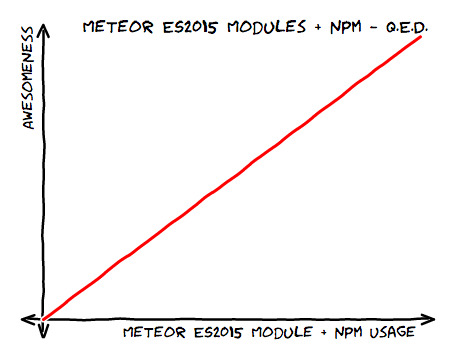Just as some background for the Node dev thing, I had to hire assistants to help with development of our software. The job listing went up months prior to 1.3’s release, and based upon Meteor 1.2, we searched for primarily front end developers who are comfortable with js. At the time, this was completely suitable for the job - I learned Meteor originally alongside a friend of mine who was a front end dev and had no problems picking it up.
After we accepted the applications and hired some employees, 1.3 released. Even the tutorials changed. When the employees started, they were NOT suitable. I ended up having to train them myself. 1.3 actually confused them more than anything.
So I have personal experience with employees that directly indicates what I stated earlier - that the job requirements are not the same as they were Pre-1.3.
In response to your first comments… The question is when did you learn Meteor. Considering you have been around the forums awhile, you learned it Pre-1.3. So your situation completely makes sense. All I can say is things are definitely not the same now days.
Now for the popularity discussion… of course our mileage may vary in our experiences, but 1 year ago Meteor was discussed everywhere. Articles about how it is so much more productive than Express, about why it’s dominating stacks, etc. Even here on the forums, things were generally very positive.
Fast forward to 2016… I was honestly shocked by coming to these forums after not coming in awhile. Morale was way down, and the general tone was much more negative than it was in 2015. Even now, there’s many more negative comments here, much more confusion with the direction of Meteor, more worry, more questions of “why?”. Even more posts on why people switched from Meteor. When a year ago it was why people switched TO Meteor.
Outside of these forums, the general tone I see now is Meteor is “a very specialized tool”. Which is drastically worse than the discussions about it 1 year ago praising it’s productivity and explaining why it makes the other stacks obsolete.
I actually haven;t seen more Meteor jobs pop up, the most I seen (locally at least) were near the end of 2015 ironically.
So it does come down to perception a bit, I see a slight decline, while you sees growth. The reality is probably a mixture of both - growth in some areas decline in others. But if things have improved so much, shouldn’t it be noticeable growth? Isn’t it kind of worrisome that the discussion went from “replacing a whole stack” to a “very specialized tool that is only useful if you absolutely need a lot of real time reactivity”?
In the end, I just hope Meteor continues to be the platform that made me love using it. The direction & apparent dropping of the core principles makes me extremely worried. I do not know what Meteor will sacrifice next in order to achieve their goals. For my position, there’s much more that could potentially be lost than it seems will be gained in the updates that are coming after 1.4.
Productivity is my top priority. Productivity used to be one of the principles Meteor was built on. If that’s sacrificed, this isn’t really Meteor anymore.


 .
.